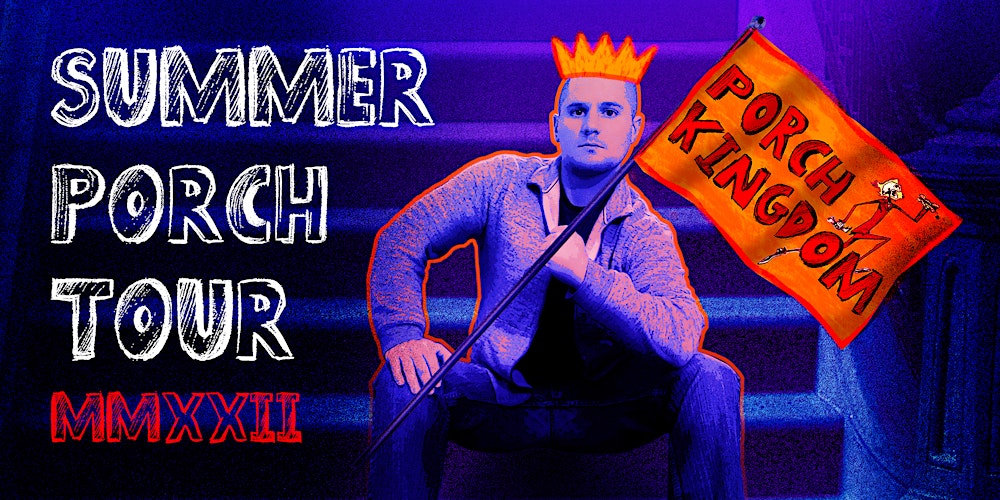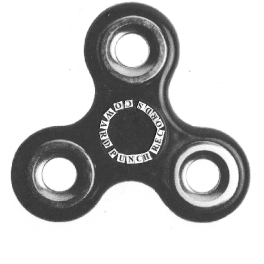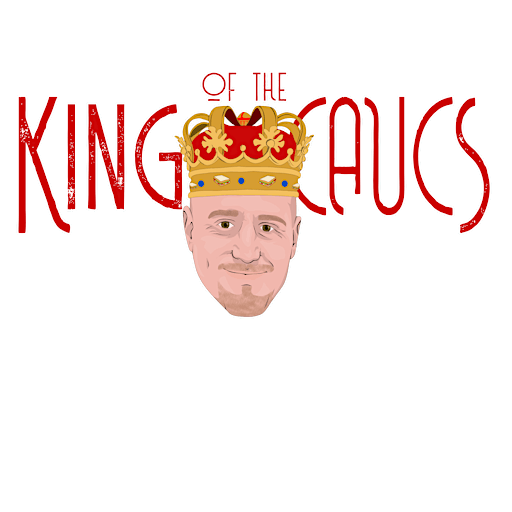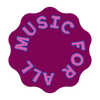[029] Amplifying Dissent with Robbie Bernstein
We had a very wholesome conversation with Robbie "The Fire" Bernstein about porches, PMA and PSYOPs.
![[029] Amplifying Dissent with Robbie Bernstein](/content/images/size/w2000/2022/07/rob_MFA-2.jpg)
This interview is part of a series discussing mandates, restrictions and censorship with musicians and music fans—read more of these interviews here.
Robbie "The Fire" Bernstein is a comedian and host of the Run Your Mouth Podcast
He also co-host the podcast Part of the Problem and has been booking his own tours, performing on porches throughout the United States including at our very own Bon Aqua Computer Club in Bon Aqua, Tennessee Saturday, July 16.

We had a wonderful time last year and are very excited to do it again this year:
The following interview was transcribed from a Zoom call that took place on July 6, 2022. Edited for brevity & clarity.
Music For All: I started this blog to encourage musicians to do things on their own outside of the traditional industry, especially with regards to touring. Initially I wanted to find venues to help plot out restriction free tour routing and have a list of venues in the U.S. that you could go to — and it just doesn't exist. I think that's really stunting independent art. Maybe you live in a town where you can play, but you can't tour easily.
I think what you're doing with porch tours is what everyone should be doing! There's this company called Undertow that started doing these living room tours with all of these indie artists for past decade or so, but now they're going really hard in the paint with vaccine requirements. But before that, it was such a really good and wholesome idea.
So, I wanted to talk to you about the logistics of planning out a porch tour, how long have you been doing them and what it actually takes for you to get them going.
Robbie The Fire: Off the bat, logistics fucking suck and I hate it but that being said, I'm fueled by pure spite and fuck you energy. As much as I hate logistics, I enjoy being able to tell comedy clubs to go fuck themselves — to be able to tell the whole industry to go fuck themselves.
While I'm friendly, clean cut Jewish and not punk rock — I do feel like porch tours are as punk rock as it gets. We're not burning anyone's house down, it's all mature 30 year olds who come over and have a couple beers and have their designated drivers take them home. We're talking about economics and freedom, so it's pretty not punk rock but the spirit of it is as punk rock as it gets.
Luckily now it's becoming more of a fan built endeavor — if you don't have this yet, don't be concerned. This is now my third or fourth year into it and more and more fans are willing to contribute. Last year you guys [Camelia @ Music For All + Andrew @ Bon Aqua Computer Club] were the first experiment in terms of getting on a flight to a random city and seeing if we could draw.
The logistics of this with my current audience, I'd have to rent a venue, get a hotel room — there would be more costs involved. The fact that I can get picked up from the airport, stay at someones house, keep 100% of the door, the financials of it switch in my favor and that gets passed onto the audience, in that:
- Tickets aren't too expensive.
- You get to hang out with me — if you're a super fan of the podcast it's not like it's an hour and a half show and you get thrown out of the venue or I escape to a greenroom.
We get to do more with the shows because we don't have a hard out. If the mood is right we do live podcasts, sometimes we do two sets, sometimes we do music. Most importantly, people get to hang out with each other, it brings a lot of like-minded people together. You're almost a little bit of a party planner, so it becomes a little bit of your total vision.
For example, if I show up to a comedy club it's still my comedy but it's their venue and it's still their thing. When you show up to something and it's like, "I put it together " the entire experience is a little bit more my flavor.
To speak to the specifics of what that means — everyone should buy tickets, but I don't check tickets. Believe me, that actually changes the vibe when people show up and they're like, "oh, I don't have to like check in with someone?" I'm telling you, off the bat it changes peoples minds, where they're like, "oh, this is more relaxed." It sets a different tone for us all hanging out. It's more of a community experience.
I try to be as cult like with my with my verbiage as possible.
MFA: [giggles]
Robbie: I think one of the cool things about getting away from traditional venues is the entire experience becomes more your vision of like, let's hang out, let's have fun, let's make it a party. As opposed to you're just the performer and that's the beginning and end of your creative contribution.
MFA: Do you usually end up breaking even?
Robbie: It's been getting better. At the moment, I make the majority of my income from my day job. A year from now, I'll probably be less relaxed about these things because I'm hoping to no longer have a day job. This is the business I'm trying to go into and I don't mind investing into it.
That being said, I keep costs as minimal as possible. My goal is not to be losing money, but I don't go crazy — it's not like I'm not going to make rent if this doesn't bring in an income.
Luckily the wheels are staring to turn now and I'm actually starting to make money. The cooler part about making money is I get to bring more performers or potentially get an editor to cut more footage. Whatever comes in, I try to put back into it.
At break even, it's the most fun thing to do. To be able to travel America, see new cities, interact with the people who are listening to the podcast, throw house parties around the country. That on its own is a blessing, that's fucking cool to do. From a business standpoint, I own all the content. If I'm doing a live podcast, I'm self-producing something I own.
Goal is to be better than break even, even at break even I see it as a win because it's fun for me to do and I'm growing what I want to grow. Luckily I'm selling more tickets now so there's more and more events I'm walking away with an income.
MFA: I think there is an unfortunate false expectation that if you aren't making a living off of your art or if you still have day job, you aren't a real artist.
Robbie: If you're a part of other peoples systems, there's going to be compromises. I have more than 100% creative control over what I do, because I literally don't need your money. It's more pure.
If artists and venues don't want to have me because they don't like what I want to do, I can be very pure about trying to attract people vs. trying to make it more broadly appealing. I'm never going to be on Comedy Central, I'm never going to try to write the jokes that can get me on them.
I found this early in comedy, I was living super poor being 100% comedy. When I showed up to the club I was like I have to make these jokes work because I need perfect jokes so I can make money doing this. The audience is just showing up trying to hang out, they just got off work — whether or not your joke worked better than the last night doesn't matter, they're there to have fun. If you work a job and you show up at like 5p, same as the audience, you're in the same space that they are so you can almost vibe with them a little better.
Anyone out there who thinks you're any less of an artist because you have something else you have to do, I don't agree with you. I think life is about struggle. A lot of good art is found in the struggle. There's perspective from it. Ideally everyone would want to put 100% into their art and if you work hard enough I hope that anyone can find that. Until you get there, don't let other people tell you you're not an artist. Fuck that.
MFA: I definitely agree. I think with the nature of how everything is evolving now, there can be a lot of discouragement from not fitting into the existing infrastructure at all. Which can lead to not having a lot of engagement initially.
Robbie: I've done hundreds and thousands of hours of content that was viewed by nobody and I didn't care, because I was getting better. You end up with more and more positive reinforcement as more people find you.
It gets a lot easier and it's a lot more fun when there's an audience. But you're not going to get to the point where there is an audience unless you're really good at it. I did 8 or 9 years with nobody giving a shit about what I was doing in any capacity.
I've done 100's of hours of unpaid stand up, 1,000's of hours of unpaid podcasting. The first ten episodes of Run Your Mouth, there were literally zero people that listened to it. I put the same amount of work in as when there's a couple thousand listeners. If I'm putting out what I care about at some point it will find an audience.
It's the joy of creating. The work is the reward. When you can find the external positivity that you want to sit down and do the work. When I sit at my desk and I'm flowing, that's the reward. If I was equating whats more joyful — when I sit at my desk and I find a joke, that's when I experience the joy. The work is the reward.
It becomes easier to do as people pay you for it and as there's an audience, but you're not going to get there unless you find the joy in the creativity. That should be the fuel and if that's not the fuel, then you should probably figure out the thing that's more your jam. If you're just looking to make money — there's easier ways to do it than through your art.
MFA: I've been thinking about how all of the movies about rags to riches musicians and stuff that was a PSYOP to make people think you get discovered at the mall and that there's no hard work — which causes people to feel like failures if they're working towards something and don't have immediate success.
For the first time in my life, I have this project where I want to stay up late working on something, I don't care if I make any money. I think everyone needs to find what that thing is for them. If people are just doing art to be cool or to make money, it doesn't work — that's when the evil shit gets in.
Robbie: I agree. In that regard I kind of let excitement be my guide. The fact that I'll sit down for no amount of money and read through vaccine efficacy literature, as opposed to spending 10 minutes on a contract that will make me thousands of dollars, absurd amounts of money. I just don't love it. When it comes to something that makes me no money, but is really exhausting, I can spend hours. There's something about it that's compelling.
If it's something that excites you, and if it's niche, go master that. There probably aren't other people that are that interested and you might be at a point where there's enough value that you can really make money off of it.
I'm being a self-righteous douche here, but I like this quote that summarizes the book Mastery, "the problem with life is that it's slow and boring and it takes a long time to see hard work to pay off or that bad actions have consequences."
What I mean by that, is on any given day you can go party, it doesn't matter it won't effect you. But if you do that every day, it will. On the same note, if you're working hard today, tomorrow and the next day you might get nowhere but if you're doing it for 5, 10, 20 years — you're gonna see some positivity.
We watch movies summarizing 10 years of someones life into an hour and a half. They always fast forward the practicing part that would be 3 to 10 years of boredom, that they then showcase in 3 minutes. I think you're right. I think our brains are falsely wired for how it should work because we're comparing ourselves to movies. Movies are distorting peoples sense of what things should look like.
MFA: I really want to research how the government co-opted all the counter culture movements.
Robbie: Can I give you some proof? You've got to go look this up this was an article I think I read maybe in Time. I've quoted it like I'm 100% sure of it but, I'm not. Andy Warhol and Jackson Pollock — the CIA was buying up their art, the reason being when we were competing with the USSR we wanted to pretend like we were more of the leader in culture.

The way they did that was by saying, "look how valuable our art was" and they were buying it. It wasn't like the market actually said this was what people were looking for.
In the modern day, you see that in terms of where advertisers are willing to place their money. I do think a lot of that is down wind from where the government and The Fed will actually make money available to people. So I do think there's a lot of government money in the system that dictates what kind of content will be created.
The purest example is something like the woke nonsense coming out of Disney or the kind of things that news corporations are allowed to cover and what their sponsors look like. There's a lot of art that's dictated by where the money is, and money is coming from government and their interest.
MFA: I've been finding a lot of people that are just quietly doing cool shit and it's really exciting.
[For example, Coward Punch Records who also interviewed Robbie!]

I think decentralization is really good but then it can make it harder to find things. The traditional marketing people are used to won't necessarily work. Community based and one-on-one marketing will, but it just grows things slowly.
Robbie: I'm a fan of learning by doing. If you've ever met a person that's not supposed to be doing logistics, it's me. Dates, places — I fuck it up. I'm like Positive Mental Attitude. You're not going to be a hero or famous tomorrow, you might not even be making a living tomorrow but just be growth oriented.
Do it because you love doing it. If you keep doing it you'll probably get better. The shit that you hate will become easier. All the sudden you turn around like cool, I built a pretty cool infrastructure here.
You're not going to figure it out staying at home and not doing it. If you're not being booked at venues and you're like, "I don't know how to throw together my own show or I don't want to." You're not getting closer to what you're trying to do. Don't look for perfection. At least if you're doing zero right now and you commit next year, I'm going to do one gig. You're closer. That doesn't mean you're going to win, but you're closer. You might find out it wasn't that hard to do.
I'm not saying there's a perfect solution, or there's anything that's quick. If you really love this, in whatever capacity — your band, drawing, shooting ping pongs out of your vagina — I don't know what your act is, but just fucking do it.
Thank you for reading!
Find more excellent Robbie "The Fire" content & other porch tour dates below:






